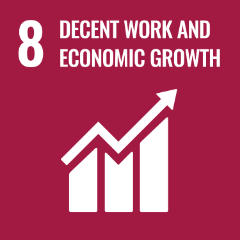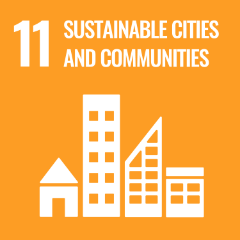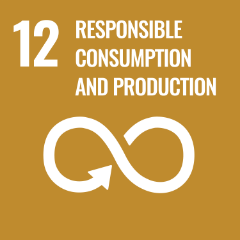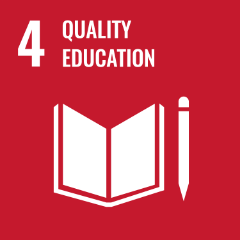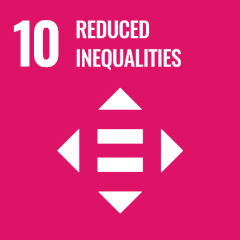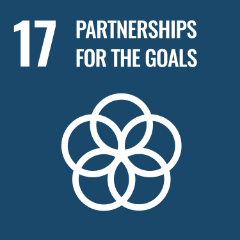Sustainability

Sustainability Basic Policy
Japan, which is characterized by a declining birthrate, aging population, and numerous deaths, faces many social issues related to medical care. Examples include “refugees from medical care,” who have limited opportunities for receiving enough care, and the exhaustion and breakdown of regional medical care.
As a first step to addressing these social issues, we have implemented a unique business model called “Ishinkan.” Since the opening of Ishinkan Nabari, we have been expanding Ishinkan from urban areas to depopulated areas and developing it broadly across Japan. In the process, we have established the business field of hospice in the medical and nursing care industry, by demonstrating the potential for providing a format through which people can live as they like with peace of mind while receiving medical care until the end of their lives.
However, many of Japan’s social issues remain to be solved. We continue working to address social issues through structural innovation, under our mission to “create a vibrant, happy society through medical and health care with an ambitious vision.” Furthermore, we want to contribute to the advancement of medicine and healthcare through our corporate activities and businesses, including the establishment and operation of Ishinkan. We are also working diligently to realize a society in which as many people as possible can enjoy the benefits.
In developing corporate activities and businesses, we pursue sustainable operations from the environmental, social, and governance perspectives, while striving to build relationships of trust with our stakeholders, thereby increasing corporate value and helping to create a sustainable society.
We contribute to solving social problems by structural innovation.
We support regional healthcare by meeting the diverse needs of each region through our corporate activities.
We disclose information in a prompt, accurate and fair manner while maintaining and accelerating growth to meet the expectations of our shareholders.
We respect the individuality of our employees and provide a comfortable, rewarding, and diverse workplace.
We emphasize the establishment of fair and transparent business relationships with our business partners, and thoroughly prevent corruption and corrupt practices.
Materiality
We have identified the following material items as important priorities in terms of our corporate activities and their impact on our stakeholders. We strive to contribute continuously to society and enhance our corporate value by addressing these issues. These efforts are led by the ESG Promotion Committee.
Realizing a Society without Regional Disparities in Healthcare
-

-
Through our corporate activities and businesses, we work to solve social and regional medical issues. As a result, we aim to realize a society in which as many people as possible can enjoy the benefits of advances in medicine and healthcare.
-
Achieving Operations in Harmony with Nature
-
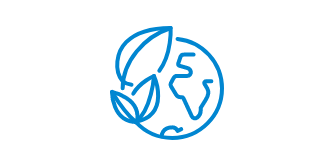
-
We continue to implement environmentally friendly initiatives. For example, we promote measures to address climate change and resource recycling.
-
Building a Workplace That Invigorates All Workers
-
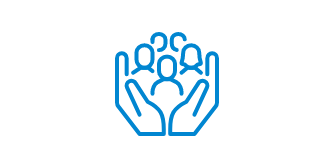
-
To maximize the strength of our organization, we respect individuals with diverse backgrounds and create a diverse workplace where all employees can work comfortably and are rewarded for their efforts.
-
Earning Further Trust from Society and Local Communities
-

-
To maintain the trust of society and local communities, we work to enhance our corporate ethics and ensure compliance with laws and regulations.
-
Environment
Addressing Social Issues
[Contributing to Society]
In the interest of efficiency in medical care, the Japanese government is pushing for a shift from hospital-based to community-based care.
Under such a system, people with high medical dependency may be discharged. Such people need to be cared for 24 hours a day to monitor any sudden changes in their condition. However, in many cases no appropriate place is available to accept such people after discharge. Accordingly, they have limited care opportunities after being discharged from the hospital. Ishinkan responds to such pressing needs. We believe that expanding the opening and operation of Ishinkan will help resolve the social issue of “refugees from medical care.”
In addition, Ishinkan provides responsible care until the end of life with a robust nursing system. The end-of-life care rate at Ishinkan is high, at 98%, leading to the trust of local physicians and other medical professionals and caregivers.
We are expanding into various areas so that Ishinkan can contribute to society at large. Even after facilities open, we conduct publicity activities to increase the number of patients and expand the base of patients.
[Contributing to Regional Healthcare]
Ishinkan is a new-concept facility, where local physicians and others gather, based on the concept of “outsourcing physician functions” and “sharing hospital beds.” Ours is also a remarkably low-cost model due to the reduction of various hospital functions. Ishinkan responds flexibly to the unique medical needs of each region, including depopulated rural areas. When opening a new facility, we carefully interview local medical workers and caregivers to understand the problems in each region and work to resolve them.
In addition, because we outsource the physician function, establishing Ishinkan does not disperse the deployment of physicians. This is an important factor for the local medical infrastructure.
By opening and operating Ishinkan, we intend to help correct the disparity in medical care between regions and shorten the length of hospital stays, making ours an indispensable platform for regional healthcare.
[Creating Local Employment]
In principle, we hire residents of each region as employees of Ishinkan. By opening about 25 new facilities each year, we help create local employment.
We also hire nurses and caregivers directly, without using temporary employment agencies.
Conserving Resources
As part of our resource conservation activities, we promote paperless operations and use cloud-based systems for accounting and electronic contracts. We are also working to comply with the Electronic Bookkeeping Law.
We keep working to reduce food waste. For example, we have introduced a cook-chill system for meals served at our facilities, which makes it easier to prepare meals in just the amounts needed.
To address climate change, we are working toward carbon neutrality. We are making our CO₂ emissions visual as part of our aim to achieve zero emissions by 2050. To reduce CO₂ emissions, we switch off lights frequently and manage air conditioning in each area.
Social
Diversity
[Employing People with Disabilities]
We respect and embrace individuals with a variety of backgrounds to maximize our organization’s power.
As part of this commitment, we directly employ people with disabilities. We strive constantly to create work styles and a workplace that encourages participation among diverse individuals.
We continue to create an organization and develop human resources that enable diverse individuals to maximize their abilities. We provide equal opportunities for compensation, education, and promotion without regard to gender, nationality, disability, or other factors.
[Empowering Women]
Women account for approximately 85% of our work force, and many women play active roles at the headquarters and at Ishinkan facilities.
In addition, the percentage of women in management positions is approximately 80%, and approximately 40% in the management meeting. These figures demonstrate that we are building an organizational structure where women can play active roles. We aim to increase the percentage of women on the management meeting to 50% by 2025.
[Diverse Individuals Playing Active Roles]
We provide an environment where nurses of all ages can work according to their life stage, and provide a workplace that serves as a reserve for potential nurses.
Because many patients at Ishinkan are in their final days, they need help not only with managing symptoms and controlling pain, but also with making decisions and meeting their spiritual needs. For this reason, many nurses are playing active roles in Ishinkan, demonstrating their own skills, knowledge, and nursing perspectives.
Nurses are also active outside of Ishinkan facilities. They work in the nursing and care department at the headquarters, the regional liaison department, the compliance department, and the recruitment department. We provide an environment where nurses can utilize their experience in a variety of ways. In addition to nurses, employees with a host of backgrounds work at the headquarters cooperating with Ishinkan.
Creating a Comfortable Workplace
[Protection of Labor Rights]
We believe that our greatest asset is our human resources and that consideration for human rights in accordance with international standards is the foundation of our management. We respect the human rights stipulated in the “ILO Declaration on Fundamental Principles and Rights at Work” of the International Labor Organization (ILO) for all officers and employees of our group (including part-timers and contractors), and are committed to the human rights issues as follows.
To fulfill our commitment to respect human rights, we expect all stakeholders, including our business partners, to understand and support the following efforts.
- Harassment and Discrimination: We eschew all forms of harassment and discrimination, regardless of gender, nationality, ideology, creed, or disability.
- Forced Labor and Child Labor: We do not engage in forced labor or child labor by any means including mandatory overtime, human trafficking, and others, and we do not tolerate modern slavery in any form.
- Freedom of Association and the Rights to Collective Bargaining: Although there are no labor unions in our group, we respect the freedom of association and the rights to collective bargaining, and we do not restrict opportunities for dialogue with our employees.
- Occupational Safety and Health, Working Hours, and Wages: We comply with applicable laws and regulations regarding working hours, minimum wages, and statutory benefits, and conclude labor-management agreements such as 36 agreements with all employees to create a healthy and safe working environment for all officers and employees of our group.
- Job Retention: We have not made any major suggestion of retirement or terminations in the past.
[Work-Life Balance]
We have created remote working and flextime systems according to the characteristics of each position to facilitate flexible working during the COVID-19 pandemic.
We believe that providing a work environment where each employee can maximize his/her performance is extremely important in the provision of high-quality services. Our headquarters tracks the overtime hours of all employees, including those at facilities. When overtime hours are high, we periodically meet with these employees and their superiors to discuss countermeasures.
In addition, we have established benefit programs such as childcare and care leave, providing a work environment in which employees in diverse situations can play an active role.
[Follow-up System]
We are committed to listening to our employees and have implemented the following initiatives to provide a comfortable and rewarding workplace:
- Orientations for new hires and prior to facility openings
- Interviews with facility employees (face to face and online)
- Post-hiring and exit surveys
- Semi-annual evaluation interview with superiors
[Efforts to Improve Capabilities]
We implement the following initiatives to improve the capabilities of our employees.
- All officers and employees of our group (including part-timers and contractors): Training and study groups to maintain and improve the quality of care, various education and training (food hygiene manager training, hygiene promoter training, and others) according to the duties and job level in charge, and subsidizing tuition and exam fees to help employees acquire necessary certifications
- New employees: Orientation for new hires and at facility openings, on-site OJT, and on-site training
- Nursing leaders: On-site training, leader education program, multidisciplinary education and training (compliance/infection), leader meetings, telephone/web follow-up systems
[Incentive Plan]
We have adopted a stock ownership plan as a medium- to long-term incentive for all employees of our group. Employees of our group who subscribe to the stock ownership association contribute a certain amount of money through deductions from their monthly salaries and bonuses. Together with incentive payments from our company, the association purchases our company’s shares every month. The program has been developed as part of the welfare system to contribute to the formation of medium- to long-term assets.
Governance
Basic Views on Corporate Governance
We aim to contribute to the sustainable growth, development, and happiness of society as a whole. We also value the interests and trust of all stakeholders. To achieve these objectives, we believe it is necessary to emphasize the rights of our shareholders and to live up to society’s trust. We consider establishing and strengthening corporate governance to be our most important management issue.
For details of our corporate governance, please click here.
[Board of Directors]
The Board of Directors consists of 5 directors (including 3 outside directors), which is an appropriate number of members. The Board of Directors makes decisions on critical business operations promptly and flexibly, as well as on matters stipulated by laws and regulations and the Articles of Incorporation, management policies, business strategies, annual business plans, and other important management matters by ensuring diversity in terms of experience, knowledge, and expertise. In addition, the Board of Directors meets once a month in principle, with all Audit & Supervisory Board members in attendance to monitor the status of business execution by directors. Extraordinary meetings of the Board of Directors are held as necessary to ensure proper and efficient business execution.
[Audit & Supervisory Board]
The Audit & Supervisory Board consists of 3 members (all of whom are outside members and 1 of whom is a full-time member) and meets once a month in principle to ensure the effectiveness and efficiency of audits and to exchange opinions among members. In addition, extraordinary meetings are held as necessary. The Audit & Supervisory Board prepares the “regulations of the Audit & Supervisory Board” and auditing standards, formulates audit plans, and shares the status of audit implementation and audit results among the Audit & Supervisory Board members. In addition, the Audit & Supervisory Board members attend important meetings such as the Board of Directors’ meetings and monitor the execution of duties by directors by expressing their opinions as necessary. They also collaborate with the Internal Audit Office and accounting auditors to improve the effectiveness and efficiency of audits.
[Management Meeting]
The Management Meeting consists of Directors, Audit & Supervisory Board members, Executive Officers, and the heads of each department. In principle, the Management Meeting is held regularly every week and on an ad-hoc basis as necessary. Critical matters are brought up for discussion at meetings of the Board of Directors after thorough deliberation at the Management Meeting, thereby ensuring enhanced deliberation and appropriate decision-making at meetings of the Board of Directors.
[Nomination and Compensation Committee]
The Nomination and Compensation Committee has been established as an advisory body to the Board of Directors to enhance corporate governance by strengthening the fairness, transparency, and objectivity of procedures related to the nomination and compensation of directors. The Nomination and Compensation Committee, consisting of 1 representative director and 3 outside directors, periodically confirms and provides appropriate advice to the Board of Directors on matters of particular importance, such as the nomination and compensation of officers. In addition, 1 full-time Audit & Supervisory Board member attends the meetings and monitors the committee by providing opinions as appropriate.
[Special Committee]
The Special Committee has a basic policy of ensuring that transactions occurring with the controlling shareholder are subject to the same appropriate terms and conditions as general transactions and deliberates as necessary to ensure the fairness and reasonableness of the content and appropriateness of the terms and conditions of transactions, and to protect the interests of the minority shareholders. The special committee consists of 3 outside directors and 3 outside Audit & Supervisory Board members, and the committee members select the chairperson.
Compliance
[Compliance Promotion Structure]
We ensure transparency and fairness in the business by outsourcing physicians. We are also strengthening compliance by implementing the following initiatives:
- Training to ensure compliance with legal standards and improve the quality of work
- Insider-related training provided upon joining our company
- Establishment of a system for the disclosure of personal information
- To ensure fair transactions, approval required for any gift or entertainment, regardless of monetary amount
- Assignment of a CSR officer (Shingo Yamaguchi, Director) and creation of an ESG Promotion Committee
[Hotline System]
We have established a system that facilitates consultations both inside and outside the company. We strive to create an organization where employees feel free to discuss problems and concerns.
- Internal: An internal hotline (consultation desk) has been set up within the nursing and care department at headquarters. Depending on the situation, this desk may provide guidance to sites, contact leaders, conduct interviews, or implement improvements.
- External: We have set up an internal reporting system that offers direct access to outside attorneys.
[Internal Audit]
The Internal Audit Office, which is independent of the business execution divisions, conducts an annual internal audit of our group’s entire operations and reports the results to the representative director and each director on a regular basis.
Internal audits conduct audits of compliance with the ethical standards by our group’s officers and employees, as well as confirm the prevention of corruption and corrupt practices such as bribery in accordance with various rules and policies.
[Policy on Eliminating Anti-Social Forces and Status of Measures]
We have established the “basic policy against antisocial forces” to eliminate any relationship with antisocial forces that threaten social order and safety and hinder the development of a sound economy and society, and are acting company-wide in accordance with this policy. As an effort to eliminate any relationship with antisocial forces, we have established the “rules for measures against antisocial forces” and the “basic rules for blocking relationships with antisocial forces,” and conduct not only investigations of business partners at the start of new transactions, but also regular investigations of business partners to ensure the continuation of transactions with existing business partners. In addition, we use opportunities such as the important meetings, orientation sessions at the time of joining our company and morning meetings held at each of the facilities to ensure that the content of these rules is thoroughly understood on a regular basis. In addition, we have joined the National Center for Removal of Criminal Organizations to collect information on antisocial forces, and consult with the police and legal counsel as needed to deal with various information and cases.
[Anti-corruption]
We aim to enhance our corporate value, by encouraging all officers and employees to act with a solid ethics in accordance with the rules and policies on corporate ethics in their daily actions.
As an example, our “Basic Policy on Anti-Corruption and Corrupt Practices” clearly prohibits bribery, and we have a system to appropriately address bribery risks and others.
In addition, training on ethics (compliance with laws and regulations, prevention of corruption, corrupt practices, and harassment and others) is provided at least once a year to all officers and employees of our group (including part-timers and contractors) to ensure that all employees are familiar with corporate ethics.
We emphasize the establishment of fair and transparent business relationships with our business partners. Through training and other means, we inform all officers and employees of our group (including part-timers and contractors) of our commitment to “compliance with laws and regulations concerning fair transactions and fair competition,” “prohibition of giving and receiving benefits and favors,” and “prohibition of activities that may lead to conflicts of interest.”
The ESG Promotion Committee, composed of directors, formulates management strategies and policies regarding sustainability. In the process, the committee also examines the establishment of transparent business relationships to strengthen corporate ethics and works to prevent corruption and corrupt practices. We demand thorough prevention of corruption and corrupt practices not only within our group but also with all suppliers.
[Quality Management]
In procuring equipment and materials, we properly evaluate and manage suppliers based on an internally developed supplier checklist to ensure and improve quality.
For new suppliers, our procurement staff examines their business conditions and quality control systems to determine whether to do business with them. For existing suppliers, we conduct ongoing inspections to evaluate quality, safety, and others about once a year, and make an internal decision on whether to continue business with them.
We also indirectly check the quality of suppliers prior to our direct suppliers through our suppliers, and the entire supply chain is subject to quality control checks.
We promote thorough quality control of care by encouraging all officers and employees of our group (including part-timers and contractors) to participate in external training (food safety supervisor course, hygiene promotion training, and others) in addition to annually providing them with various quality-related training (prevention of abuse and proper use of physical restraints, prevention of infectious diseases and food poisoning, and others).
Information Security
[Maintaining Information Security]
To protect the information assets of customers and other parties handled in our group’s business and the information assets of our group from various threats, and to fulfill our social mission as a corporation, we have established the “basic policy for information security,” “privacy policy,” and other related rules and regulations.
In addition to employee education on information management, we require employees (including retired employees) to submit a pledge of confidentiality. Furthermore, we strive to reduce the risk of information leaks by restricting access to servers and disks outside the scope of each employee’s business needs in accordance with their duties and job classification, and by encrypting personal information obtained.
To ensure such information security of our group, we have established an Information Security Management Committee consisting mainly of directors and have put in place a management system throughout our group.
The Information Security Management Committee assesses potential information security risks to information and information processing facilities and equipment, mitigates and eliminates these risks, manages information security, and deliberates and decides on incident response.
While firewalls, access control, and other security measures are in place to prevent incidents, specific response procedures are formulated in normal times to enable timely analysis, containment, eradication of the cause, restoration, and prevention of recurrence in the event that a security incident occurs or is suspected to have occurred.
In addition, internal auditors conduct an annual internal audit of the information security policy and information security system. Furthermore, an annual assessment of IT controls is conducted by an external advisory body and necessary improvements are made on an ongoing basis.
[Privacy Policy]
Personal information handled in the course of all businesses in our group is handled appropriately in accordance with the following policy. We do not collect personal information from third parties and discard personal information after the required retention period has passed. Furthermore, we require our suppliers to comply with the policy.
- Privacy Policy (August 21, 2023) (184KB)
ESG Data
Environment
[Electricity Consumption and CO₂ Emissions]
| FY2022 | FY2023 | FY2024 | Quantitative objectives |
|
|---|---|---|---|---|
| SCOPE1 (t-CO₂) | 2,160 | 2,630 | 1,378 | - |
| SCOPE2 (t-CO₂) | 4,348 | 5,946 | 8,265 | - |
| SCOPE1,2 total | 6,508 | 8,576 | 9,644 | - |
| Electricity consumption (MWh) | 9,848 | 13,513 | 19,640 | - |
| CO₂ emissions intensity | 0.28 | 0.26 | 0.23 | 0 (2050) |
*1 CO₂ emission intensity is calculated as CO₂ emissions (t-CO₂) divided by net sales (million yen).
Society
[Employees]
| FY2019 | FY2020 | FY2021 | FY2022 | FY2023 | FY2024 | |
|---|---|---|---|---|---|---|
| Number of employees | 594 (190) |
972 (217) |
1,446 (301) |
2,184 (416) |
2,974 (499) |
4,046 (589) |
| Average years of service | 1.62 | 2.04 | 2.08 | 2.03 | 2.20 | 2.20 |
| (Reference) Average years of facility operation |
2.4 | 2.5 | 2.6 | 2.8 | 2.9 | 1.9 |
| Average age | 39.3 | 38.7 | 39.4 | 39.6 | 39.7 | 39.3 |
*1 The number of employees excludes those seconded from our group to outside parties and includes employees seconded from outside parties to our group. The number of temporary employees (including part-time and temporary employees, but excluding temporary employees dispatched from human resources companies) is the average number of people per year (converted to eight hours per day) shown in parentheses.
*2 Average years of service and average age are those for all permanent employees.
[Percentage of Women]
| FY2019 | FY2020 | FY2021 | FY2022 | FY2023 | FY2024 | Quantitative objectives |
|
|---|---|---|---|---|---|---|---|
| Percentage of women among employees | 85% | 85% | 85% | 85% | 85% | 83% | - |
| Percentage of women in management positions | 75% | 65% | 75% | 80% | 75% | 83.7% | - |
| Percentage of women in management meeting | 33% | 30% | 33% | 40% | 40% | 40% | 50% (2025) |
*1 Percentages are monthly figures at the end of each fiscal year.
Governance
[Board of Directors]
| FY2019 | FY2020 | FY2021 | FY2022 | FY2023 | FY2024 | Quantitative objectives |
|
|---|---|---|---|---|---|---|---|
| Number of meetings held | 30 | 18 | 18 | 17 | 18 | 19 | - |
| Average attendance rate | 99% | 96% | 100% | 97% | 100% | 99% | - |
| Number of directors | 6 | 7 | 5 | 5 | 5 | 5 | - |
| Number of outside directors | 1 | 1 | 1 | 2 | 2 | 3 | - |
| Ratio of outside directors | 17% | 14% | 20% | 40% | 40% | 60% | 50% |
| Number of women directors | 1 | 0 | 0 | 0 | 0 | 1 | 1 or more (2025) |
*1 The attendance of officers appointed during each term is based on the results since their appointment.
*2 The number of officers includes those who resigned or retired during each term.
[Auditor & Supervisory Board]
| FY2019 | FY2020 | FY2021 | FY2022 | FY2023 | FY2024 | |
|---|---|---|---|---|---|---|
| Number of meetings held | 15 | 12 | 13 | 13 | 13 | 12 |
| Average attendance rate | 100% | 100% | 100% | 100% | 100% | 100% |
| Number of Audit & Supervisory Board members | 4 | 3 | 4 | 3 | 3 | 3 |
| Number of outside Audit & Supervisory Board members | 4 | 3 | 4 | 3 | 3 | 3 |
| Ratio of outside Audit & Supervisory Board members | 100% | 100% | 100% | 100% | 100% | 100% |
*1 The attendance of officers appointed during each term is based on the results since their appointment.
*2 The number of officers includes those who retired or resigned during each term.
[Nomination and Compensation Committee]
| FY2019 | FY2020 | FY2021 | FY2022 | FY2023 | FY2024 | |
|---|---|---|---|---|---|---|
| Number of meetings held | 1 | 2 | 1 | 2 | 3 | 4 |
| Average attendance rate | 100% | 100% | 100% | 100% | 100% | 100% |
| Number of attendees | 3 | 3 | 3 | 4 | 4 | 4 |
| Number of outside officers in attendance | 2 | 2 | 2 | 3 | 3 | 3 |
| Attendance rate of outside officers | 67% | 67% | 67% | 75% | 75% | 75% |
*1 The attendance of officers appointed during each term is based on the results since their appointment.
[Special Committee]
| FY2019 | FY2020 | FY2021 | FY2022 | FY2023 | FY2024 | |
|---|---|---|---|---|---|---|
| Number of meetings held | - | - | - | 1 | 2 | 3 |
| Average attendance rate | - | - | - | 100% | 100% | 100% |
| Number of attendees | - | - | - | 5 | 5 | 6 |
| Number of outside officers in attendance | - | - | - | 5 | 5 | 3 |
| Attendance rate of outside officers | - | - | - | 100% | 100% | 50% |


